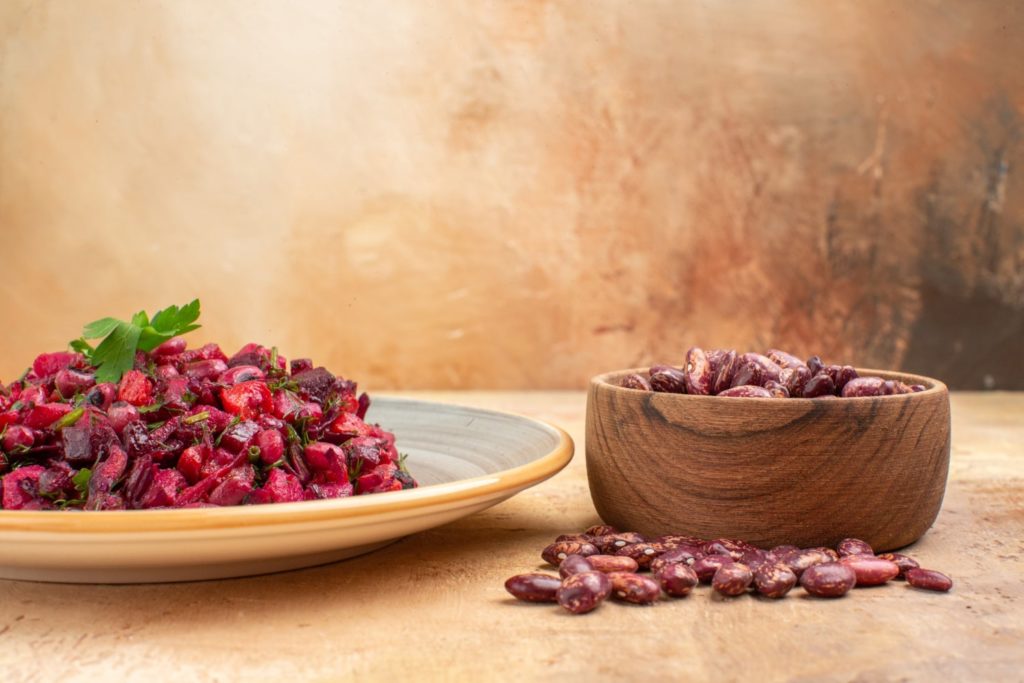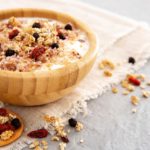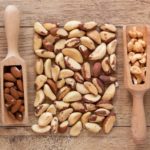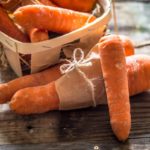
Bernadeth Atrinindarti
MAppSc (Advanced Nutrition Practice)
Jump to:
In part one of the “Anti-Cancer Foods” series on the healthiest vegetables, we discuss the cancer-fighting properties of:
- Arugula
- Asparagus
- Beans
- Beets
and also look at what research says concerning nutrient profiles if these vegetables are grown organic and non-organic.
Potency: Organic or Non-Organic vegetables
The terms “organic” and “non-organic” refer to the methods used in cultivating and producing vegetables.
Organic vegetables are grown without synthetic pesticides, herbicides, and fertilisers, while non-organic vegetables may be produced using conventional farming methods that may involve the use of synthetic chemicals.
Some studies suggest organic vegetables have fewer pesticide residues, while others argue conventionally grown produce is within safety limits.
Vegetables are generally a rich source of vitamins, minerals, fiber and antioxidants, which contribute to overall health and may help protect against cancer in various ways. Here are some considerations:
- Antioxidants content in vegetables may help neutralise free radicals in the body. Free radicals can damage cells and contribute to the development of cancer.
- Fiber may have a protective effect against colorectal cancer. Fiber helps maintain digestive health and may reduce the risk of certain cancers.
A study by Braudy et al. found that a higher consumption of organic food was significantly associated with a reduced overall cancer risk.
This study was conducted involving 68,946 French participants with a follow up time of 4.5 years. According to this study, high organic food consumption was linked to a reduced risk of:
- postmenopausal breast cancer
- non-Hodgkin lymphoma[1]
However, research investigating the underlying factors involved with this association is needed to implement adapted and targeted public health measures for cancer prevention.
Vegetables and Cancer
Vegetables offer numerous potential benefits for reducing the risk of cancer and supporting overall health.
Key nutrients and compounds such as:
- Vitamin C (Immunity and Collagen booster)
- Vitamin E
- Carotenoids
- Glucosinolates
- Flavonoids
contribute to this protective effect by neutralizing free radicals, reducing oxidative stress, and enhancing the body’s detoxification processes.[2]
Epidemiological studies have shown that diets high in vegetables are associated with a lower risk of several cancers including colorectal, lung, breast, and prostate cancers.
Regular intake of vegetables supports a healthy immune system, helps maintain a healthy gut through dietary fiber, and can inhibit the growth of cancer cells.
Despite some variation in findings across studies, the overall evidence suggests that incorporating a wide range of vegetables into the diet is a crucial component of cancer prevention and promotes overall health and well-being.
Arugula (Rocket)
Arugula is high in antioxidants whose compounds can protect against or reverse damage to our cells. Arugula also has glucosinolates. These natural substances may protect us against certain cancers including:
- Breast cancer
- Lung cancer
- Colon cancer
- Prostate cancer
RELATED — Prostate Cancer: All you need to know and are afraid to ask
A study looked at erucin, which is a large compound in arugula that is also associated with reduced risk of various types of cancer.
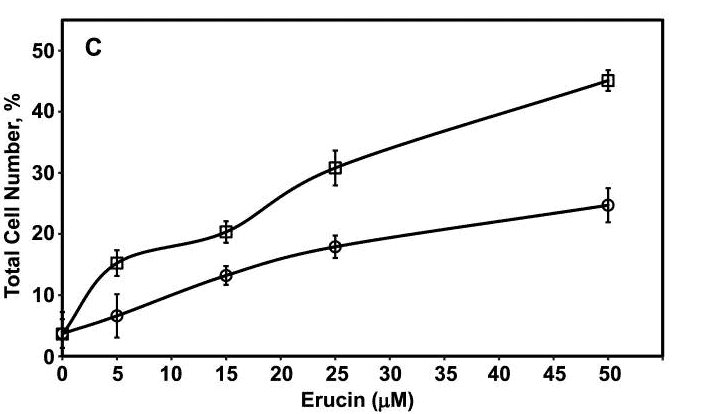
Cells were incubated with a range of erucin concentrations for 24 hours (-○-) and 48 hours (-□-) and the total number of apoptotic cells.
The study found that erucin induces apoptosis of MCF7 breast cancer cells in time and dose dependent manner.[3]
Asparagus
Asparagus (Asparagus officinalis L.) is a good source of vitamin A, C and K as well as folate and calcium, which contribute to overall health and may indirectly lower cancer risk through supporting immune function and promoting cellular health.
RELATED — Calcium (for healthy bones, teeth and heart)
Research shows foods high in folate are likely to help protect against pancreatic cancer and there is some evidence that food containing folate decreases the risk of cancer of the esophagus and bowel.[4]
Foods high in folate can protect against pancreatic cancer
Asparagus is also a source of fiber and there’s evidence that foods high in dietary fiber, especially unprocessed, may help protect against bowel cancer.
A study by Romani et al. showed anti-cancer activity of asparagus extract on breast cancer cells.
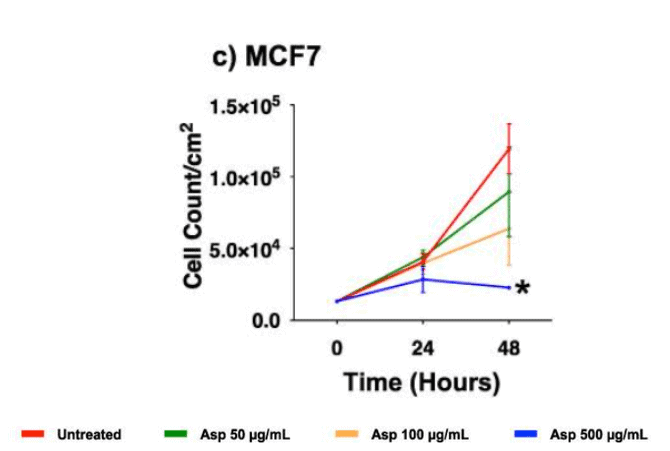
The results showed a significant reduction in viable MCF7 breast cancer cells after 48 hours of treatment with 500µg/mL asparagus extract, compared to untreated cells.[5]
Beans
Beans, including varieties such as:
- black beans
- kidney beans
- lentils
- chickpeas
are often cited for their health benefits, particularly in relation to cancer risk.
A study by Bennink et al. reported that consumption of black beans and/or navy beans could reduce colon carcinogenesis in rats.
Rats were fed a control diet or diets with 75% black or navy beans for 4 weeks. The beans were soaked overnight and cooked in open kettles until soft and then dried in a convection oven.
The incidence of colon adenocarcinomas was significantly lower in rats fed black beans (9%) and navy beans (14%) compared to the control diet (36%).
The control diet was a modified AIN-93G diet containing corn oil, protein (12.69g/100g), fat (16%), and amino acid.
Total tumor multiplicity was also significantly lower in rats fed beans compared to the control diet.[6]
Beetroot
Beetroot (Beta vulgaris L.) is a high-nutrient vegetable used in salads and juices. It is also a valuable source of natural pigments.
In the Traditional Persian Medicine practices, beetroot is one of the foods used in the prevention and managing of metastatic progression of cancer.
Beetroot contains betalains and flavonoids
Bioactive compounds such as betalains and flavonoids are shown to be beneficial to treat cancer.
A research study indicated that beetroot hydro-alcoholic extract (BHE) and betanin a bioactive compound in beetroot, significantly inhibited the growth of colorectal cancer cell (Caco-2, HT-29) lines in time and dose-dependent manner.[7]
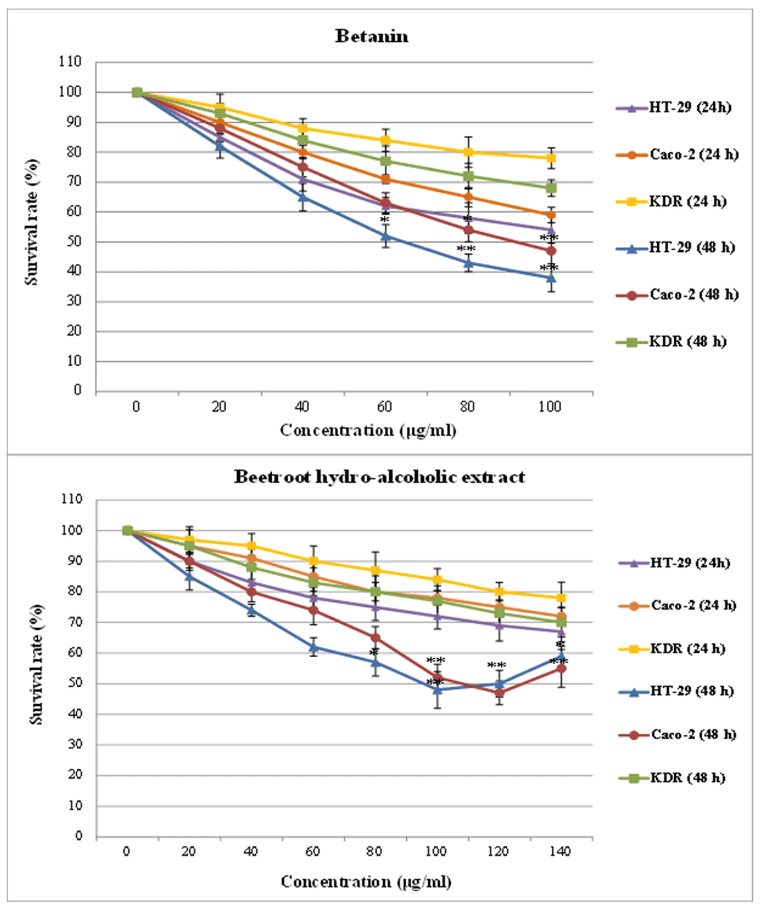
The colorectal cancer lines were treated with 92µg/mL, 107µg/mL of BHE and 64µg/mL, 90µg/mL of betanin for 48 hours.
Related Questions
1. How important is nutrition during chemotherapy?
Balanced nutrition is important during chemotherapy because it removes processed foods.
It also affects the way your body tolerates certain foods and uses nutrients. During chemotherapy you might need to change the diet to help build up your strength and withstand the effect of the treatment.
For example, you might need to consume high-protein and high-calorie foods to keep up with the weight changes.
2. What cancers are affected by diet?
Diet can have an impact on preventing the risk of several cancers, including colorectal, breast, prostate, and stomach cancers.
It is recommended that certain foods are included into your diet, such as:
- Cruciferous vegetables (cabbage, cauliflower, broccoli and bok choy) consumption has been linked to a lower risk of lung cancer
- Diets high in foods containing monounsaturated fat (olive oil, nuts, seeds) may reduce the risk of breast cancer
- High-fat diet mostly from animal fat sources may increase the risk of prostate cancer
- Consuming large amounts of processed meat and alcohol may increase the risk of bowel cancer.
3. What foods shrink tumours?
While no single food can completely eliminate tumor growth, incorporating cancer-fighting foods into your diet can reduce the risk of developing the disease.
The foods below are known to help shrink benign tumors and lower cancer risks.
- Cruciferous vegetable
- Green tea
- Berries
- Legumes
- Folate rich foods
- Whole grains
- Walnuts
Bernadeth’s passion in cooking, food and health led her to learn more about nutrition and the importance of functional foods…
If you would like to learn more about Bernadeth, see Expert: Bernadeth Atrinindarti.
References
(1) Baudry, J., Assmann, K. E., Touvier, M., Allès, B., Seconda, L., Latino-Martel, P., Ezzedine, K., Galan, P., Hercberg, S., Lairon, D., & Kesse-Guyot, E. (2018). Association of Frequency of Organic Food Consumption With Cancer Risk: Findings From the NutriNet-Santé Prospective Cohort Study. JAMA internal medicine, 178(12), 1597–1606. https://doi.org/10.1001/jamainternmed.2018.4357
(2) Farvid, M.S., Chen, W.Y., Rosner, B.A., Tamimi, R.M., Willett, W.C. and Eliassen, A.H. (2019), Fruit and vegetable consumption and breast cancer incidence: Repeated measures over 30 years of follow-up. Int. J. Cancer, 144: 1496-1510.
(3) Azarenko, O., Jordan, M. A., & Wilson, L. (2014). Erucin, the major isothiocyanate in arugula (Eruca sativa), inhibits proliferation of MCF7 tumor cells by suppressing microtubule dynamics. PloS one, 9(6), e100599. https://doi.org/10.1371/journal.pone.0100599
(4) Denise. Does asparagus contain cancer preventing vitamins? Retrieved from https://www.cancer.org.au/iheard/does-asparagus-contain-cancer-preventing-vitamins
(5) Romani, A., Casciano, F., Stevanin, C., Maietti, A., Tedeschi, P., Secchiero, P., Marchetti, N., & Voltan, R. (2021). Anticancer Activity of Aqueous Extracts from Asparagus officinalis L. Byproduct on Breast Cancer Cells. Molecules (Basel, Switzerland), 26(21), 6369. https://doi.org/10.3390/molecules26216369
(6) Bennink, M. R. (2002). Consumption of Black Beans and Navy Beans (Phaseolus vulgaris) Reduced Azoxymethane-Induced Colon Cancer in Rats. Nutrition and Cancer, 44(1), 60–65.
(7) Saber, A., Abedimanesh, N., Somi, MH. et al. Anticancer properties of red beetroot hydro-alcoholic extract and its main constituent; betanin on colorectal cancer cell lines. BMC Complement Med Ther 23, 246 (2023). https://doi.org/10.1186/s12906-023-04077-7

